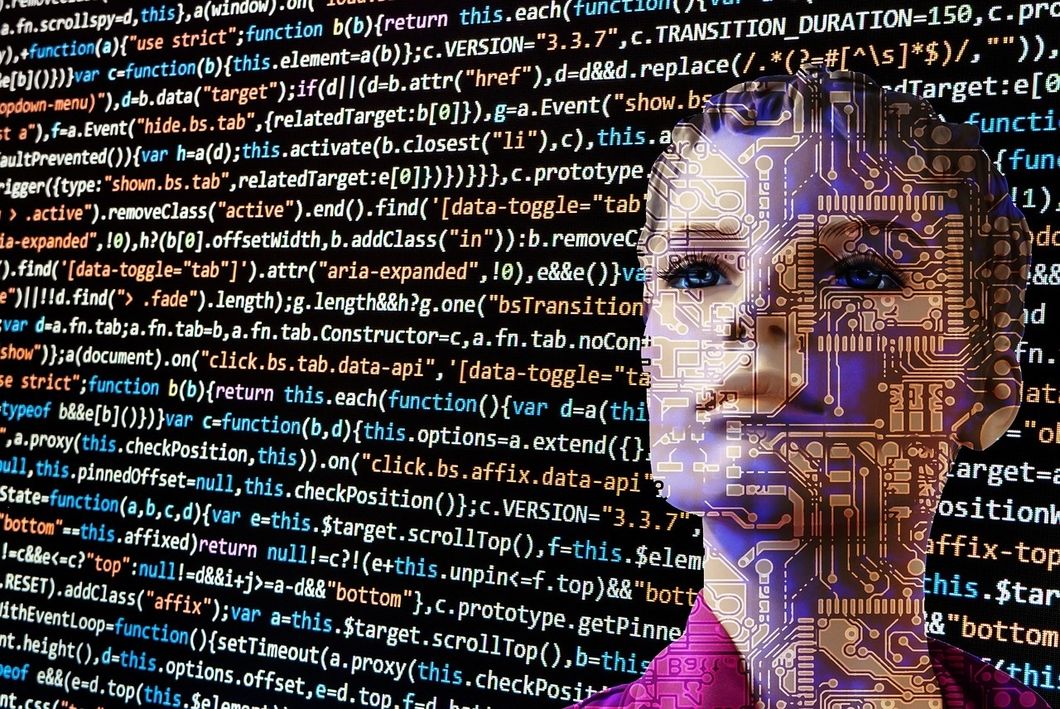A.I. is not the only form of intelligence that is programmed; humans are also programmed through DNA sequences and living up to societal expectations. The way human bodies biologically work is written in the human DNA code, which can be considered the body's blueprint. Similar to humans, the way the A.I. functions is through code, but rather than DNA A.I. is programmed through software such as Python, C++, or Java to replicate human functions. A great percentage of human functions, from bodily functions to social interaction, is controlled by DNA, just as every move or function of a robot is programmed. However, the difference between humans and A.I. is that humans adapt to expectations of a given society while A.I. does not necessarily do so. A human child does not have self-awareness until around the age of five, and this can be demonstrated through placing a dot on the nose of a toddler and placing them in front of a mirror. Instead of wiping the drawn dot off their own nose, the child will try to wipe it off the mirror because a sense of self has not yet been developed. In Ex Machina (2015), Ava does not necessarily have a sense of self in the beginning, but as the film's plot begins to unfold Ava's sense of self becomes more clear, especially in the scene when she questions Caleb about whether she deserves the same freedom he has as a human along with her growing desire for this free will further developing her consciousness. Ava's awareness of herself is also presented in the scene where she is finally free of Nathan and heads to the room where a collection of other A.I. Nathan has developed are stored. When she peels the skin off another A.I. machine and places it on herself to make her look human and cover evidence of machinery, she demonstrates an understanding of the importance of social construct and adapts to society's expectation just as a human does. Since this consciousness and awareness of the self and surroundings is what distinguishes between A.I. and humans beyond DNA or code, Ava is a true A.I. that has human intelligence because she possesses these characteristics and moves through the same stages a toddler would when adapting to surroundings, but she does so much faster than a human would. With the advancement of A.I. today, there is a possibility that Turing-test-passing A.I. with the consciousness of humans will be developed. Should humans fear reaching this stage? Will the development of an A.I., like Ava, be the beginning of the end of human life on earth?
At the rate human evolution and technological evolution are currently growing, it is reasonable to fear the ultimate destruction of human life on earth, as there will come a point where computer intelligence will surpass human intelligence. Both technology and economy grow exponentially, but both grow at different rates where technological growth rate "doubles every two years" and economic activity "doubles every five years" with corporation life expectancy dropping "from 75 in 1930 to 15 today," (Hooper). If technological and human advancement in society continues to grow at this rate, as shown in Figure 1 on the next page, then machine computing and processing will surpass human computing and functions by 2050, which is the same year experts predict the advent of true A.G.I. This means that the year the true A.G.I is developed is the year technological and computer intelligence capabilities surpass the capabilities of human intelligence because technology will continue to advance exponentially faster than human society will advance. Considering the well-known evolutionary theory by Charles Darwin where natural selection results in the survival of the fittest species, humans could possibly go extinct with the arrival of true A.I. Since A.I. will have human characteristics, humans would have essentially created another form or species of human that can function more efficiently than we do now. The survival of the fittest theory applies to all living species, and if humans create Turing-test-passing A.I., the rule will apply to this new species that we have created. Looking at Figure 1, the A.I. is essentially still a computer that will continue to grow at the high exponential rate with technology, while humans will not advance enough in society to catch up. Eventually, A.I. will become a more fit species than current humans are, resulting in the elimination of our species through natural selection, just as Ava outsmarted her creator Nathan and kills him after she gains her freedom.

Figure 1 (Hooper).
However, there is a way to prevent this destruction of humans with the arrival of A.I., and that is to make humans more fit or technology less fit for survival. Humans are innately curious, and that curiosity often results in madness when the quest for knowledge becomes excessive. It is not necessary to act upon the instinct of curiosity every time they arrive because there needs to be moderation in the amount of knowledge we receive at a given time. If humans limit the excessive quest for knowledge that has caused the high-speed advancement in technology, the gap between the exponential growth of technological advancement in A.I. and the exponential growth of human society/intelligence advancement will become smaller. Decreasing that gap will prevent computer intelligence from surpassing human intelligence before we are able to adapt to that change, and therefore preventing the possibility of human extinction. Whether or not humans will be able to slow down the advancement of technology or speed up the advancement of human society and intelligence to close the gap is currently unknown, which is reflected in the ambiguous ending of Ex Machina (2015).
Alex Garland's choice of ending for the film Ex Machina reflects the uncertainty and fear of the consequences that may come with the advent of true A.I. in real life. After Ava leaves the house and into the real world for the first time, it is unknown what happens between her and the helicopter pilot that allows her to reach civilization. This displays the extent to which an A.I. can resemble a true human being, and this causes fear for current humans because there is a possibility that we could get fooled by A.I. as well. When Ava reaches the city where people stroll down the street and go about their daily lives, her reflection is shown in a pane of glass rather than a clear image focusing on her with the camera. The panes of glass resemble the ones she lived behind in Nathan's lab, which means that although she has escaped the bondage of Nathan, she is not necessarily free as she is now tied down with the shackles of society. She has simply moved from a smaller fish tank to a bigger fish tank. However, it is that bondage that, "presents human minds with two tasks: to develop from self-knowledge a conscious desire to persevere in being and to attain the means the means to perseverance,"(LeBuffe). With the maintenance of bondage even outside of physical walls, Ava is able to maintain and even advance her states of consciousness and cognitive ability, which gives the ending of the film a negative outlook or prediction on the future of A.I. The outcome of the film after the ending depends on whether or not humanity takes the necessary step to slow down technological advancement, or is it too late now that Ava is already out in the real world and holds secrets necessary for our survival?
Although Alex Garland's Ex Machina portrays technology in an unrealistic manner, it is a realistic and accurate projection of fears and concerns we have as humans toward the advancement and successful development of Turing-test-passing A.I. Unless humans take necessary measures to prevent the arrival of A.I. before we are adapted to and are caught up with the currently fast rate that technology is advancing, we may cause our very own extinction. The ending of the film is a statement that says it is up to current humans to ensure the safety, security, and preparedness for A.I.'s inevitable arrival. A part of why the film causes fear is because humans, by nature, fear the unknown, and with the great uncertainty in the future of A.I., there is a valid reason for that fear. However, it is up to the current generation to take these matters seriously and work toward seeking answers to the necessary questions only: to ensure that excessive curiosity does not end us.

















